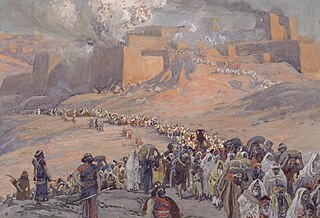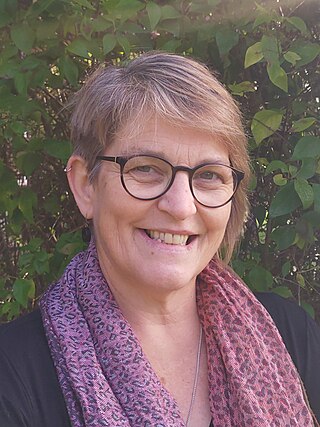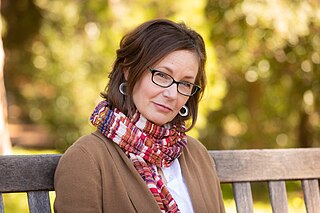Related Research Articles
The Book of Ezekiel is the third of the Latter Prophets in the Tanakh and one of the major prophetic books, following Isaiah and Jeremiah. According to the book itself, it records six visions of the prophet Ezekiel, exiled in Babylon, during the 22 years from 593 to 571 BCE, although it is the product of a long and complex history and does not necessarily preserve the very words of the prophet.

The Babylonian captivity or Babylonian exile is the period in Jewish history during which a large number of Judeans from the ancient Kingdom of Judah were captives in Babylon, the capital city of the Neo-Babylonian Empire, following their defeat in the Jewish–Babylonian War and the destruction of Solomon's Temple in Jerusalem. The event is known to be historical, and is described in the Hebrew Bible in addition to archaeological and extra-biblical sources.

According to the Hebrew Bible, the tribe of Judah was one of the twelve Tribes of Israel, named after Judah, the son of Jacob. Judah was the first tribe to take its place in the Land of Israel, occupying the southern part of the territory. Jesse and his sons, including King David, belonged to this tribe.

Jeremiah, also called Jeremias or the "weeping prophet", was one of the major prophets of the Hebrew Bible. According to Jewish tradition, Jeremiah authored the Book of Jeremiah, the Books of Kings and the Book of Lamentations, with the assistance and under the editorship of Baruch ben Neriah, his scribe and disciple.

The major prophets is a grouping of books in the Christian Old Testament that does not occur in the Hebrew Bible. All of these books are traditionally regarded as authored by a prophet such as Jeremiah, Isaiah, Daniel, and Ezekiel. The term "major" has nothing to do with the achievement or importance of the prophets, rather with the length of the books. In comparison to the books of the Twelve Minor Prophets, whose books are short and grouped together into one single book in the Hebrew Bible, these books are much longer.

Biblical cosmology is the account of the universe and its laws in the Bible. The Bible was formed over many centuries, involving many authors, and reflects shifting patterns of religious belief; consequently, its cosmology is not always consistent. Nor do the biblical texts necessarily represent the beliefs of all Jews or Christians at the time they were put into writing: the majority of the texts making up the Hebrew Bible or Old Testament in particular represent the beliefs of only a small segment of the ancient Israelite community, the members of a late Judean religious tradition centered in Jerusalem and devoted to the exclusive worship of Yahweh.

Biblical criticism is the use of critical analysis to understand and explain the Bible. During the eighteenth century, when it began as historical-biblical criticism, it was based on two distinguishing characteristics: (1) the scientific concern to avoid dogma and bias by applying a neutral, non-sectarian, reason-based judgment to the study of the Bible, and (2) the belief that the reconstruction of the historical events behind the texts, as well as the history of how the texts themselves developed, would lead to a correct understanding of the Bible. This sets it apart from earlier, pre-critical methods; from the anti-critical methods of those who oppose criticism-based study; from the post-critical orientation of later scholarship; and from the multiple distinct schools of criticism into which it evolved in the late twentieth and early twenty-first centuries.
The Deuteronomist, abbreviated as either Dtr or simply D, may refer either to the source document underlying the core chapters (12–26) of the Book of Deuteronomy, or to the broader "school" that produced all of Deuteronomy as well as the Deuteronomistic history of Joshua, Judges, Samuel, Kings, and also the Book of Jeremiah. The adjectives "Deuteronomic" and "Deuteronomistic" are sometimes used interchangeably; if they are distinguished, then the first refers to the core of Deuteronomy and the second to all of Deuteronomy and the history.
Biblical Aramaic is the form of Aramaic that is used in the books of Daniel and Ezra in the Hebrew Bible. It should not be confused with the Targums – Aramaic paraphrases, explanations and expansions of the Hebrew scriptures.

The Australian College of Theology (ACT) is an Australian higher education provider based in Sydney, New South Wales. The college delivers awards in ministry and theology. It is now one of two major consortia of theological colleges in Australia, alongside the University of Divinity. Over 23,000 people have graduated since the foundation of the college. On 7 October 2022 it was granted university college status by the Tertiary Education Quality and Standards Agency.

The University of Divinity is an Australian collegiate university of specialisation in divinity. It is constituted by eleven theological colleges from eight denominations. The University of Divinity is the direct successor of the second oldest degree-granting authority in the State of Victoria, the Melbourne College of Divinity. The university's chancery and administration are located in Box Hill, a suburb of Melbourne in the state of Victoria.

Ridley College, briefly also known as Ridley Melbourne, is a Christian theological college in the parklands of central Melbourne in the Australian state of Victoria. Established in 1910, it has an evangelical foundation and outlook and is affiliated with the Australian College of Theology and the Anglican Church of Australia. The college offers on-campus and distance learning and provides training for various Christian ministries in a range of contexts.
Whitley College is a Baptist theological institute in Melbourne, Victoria, Australia. The college is associated with the Baptist Union of Victoria and is one of the theological schools of the University of Divinity.
Dorothy Ann Lee is an Australian theologian and Anglican priest, formerly dean of the Trinity College Theological School, Melbourne, a college of the University of Divinity, and continuing as Frank Woods Distinguished Professor of New Testament. Her main research interests include the narrative and theology of the Gospels, particularly the Gospel of John, spirituality in the New Testament, the Transfiguration and Anglican worship.
Marvin Alan Sweeney is Professor of Hebrew Bible at Claremont School of Theology (1994–present). Dr. Sweeney was trained under the tutelage of Rolf P. Knierim at Claremont Graduate University. He was a Yad ha-Nadiv/Barecha Foundation Post-Doctoral Fellow in Jewish Studies at the Hebrew University of Jerusalem, where he worked with Moshe Greenberg (1989-1990); a Lilly Theological Research Grant Recipient (1997-1998); and a Fellow of the Summer Institute for Modern Israel Studies, sponsored by the American Jewish Committee and Brandeis University (2004). Sweeney previously taught in the Religious Studies Department and Judaic Studies Program at the University of Miami in Coral Gables, FL (1983-1994), and he has served as Dorot Research Professor at the W. F. Albright Institute in Jerusalem, Israel (1993-1994); Visiting Professor of Bible at the Hebrew Union College—Jewish Institute of Religion, Los Angeles, CA ; Underwood Professor of Divinity at Yonsei University in Seoul, Korea (2011); visiting scholar at Chang Jung Christian University in Tainan, Taiwan (2015); and Professor of Tanak at the Academy for Jewish Religion California, Los Angeles, CA (2000-2019). He also serves on the faculty of Religion at Claremont Graduate University (1994–present). In 2019, Sweeney relocated to Salem, Oregon, due to the attempted transfer of Claremont School of Theology to Willamette University.
Daniel Isaac Block is a Canadian/American Old Testament scholar. He is Gunther H. Knoedler Professor Emeritus of Old Testament at Wheaton College.

Jacqueline E. Lapsley serves as President, and Professor of Old Testament at Union Presbyterian Seminary, and served as Dean and Vice President of Academic Affairs and Professor of Old Testament at Princeton Theological Seminary (PTS). Her research interests lie in various fields, including literary theory, ethics, theological anthropology, and gender theory. These disciplines serve as valuable tools for Lapsley when approaching theological interpretations of the Old Testament.

Elizabeth Boase is an Australian biblical scholar and the inaugural Dean of the School of Graduate Research at the University of Divinity in Melbourne. Boase uses a range of hermeneutical approaches in her work but is particularly known for her use of trauma theory as an hermeneutical lens to interpret the Bible. She also publishes in the areas of Hebrew Bible, the Book of Lamentations, the Book of Jeremiah, Biblical Hermeneutics, Bakhtin and the Bible, and Ecological Hermeneutics.

Sandra L. Richter is an Old Testament scholar, author, international speaker, and professor, who currently holds the Robert H. Gundry Chair of Biblical Studies at Westmont College in Santa Barbara, California. Her areas of specialization include Environmental Theology, Hebrew Language, Deuteronomy, the Deuteronomistic History, and the intersection between Syro-Palestinian Archeology and the Bible.
Sister Mary Coloe is an Australian religious sister and New Testament biblical scholar who specializes in the Gospel of John. She is a member of the Sisters of the Presentation of the Virgin Mary, a Roman Catholic religious order dedicated to teaching and service to the poor. She is a professor at Yarra Theological Union, in Box Hill, Victoria, Australia.
References
- ↑ Hiebel, Janina (2013). The vision accounts in the Book of Ezekiel as interrelated narratives: A Redaction-critical and theological study (phd thesis). Murdoch University.
- ↑ Hiebel, Janina Maria (16 June 2015). Ezekiel's Vision Accounts as Interrelated Narratives. De Gruyter. doi:10.1515/9783110406658. ISBN 978-3-11-040665-8.
- 1 2 "Janina Hiebel | University of Divinity Staff directory". staff.divinity.edu.au. Retrieved 24 September 2021.
- 1 2 "Janina Hiebel, DiplTheol (Germany), PhD". Yarra Theological Union. Retrieved 24 September 2021.
- 1 2 3 "Friendly Guide to Women in the Old Testament | Garratt Publishing". garrattpublishing.com.au. Retrieved 24 September 2021.
- ↑ "Executive". www.catholicbiblical.asn.au. Retrieved 24 September 2021.
- ↑ "160+ Australian and New Zealander Women in Theology You Should Know About - Graham Joseph Hill and Jen Barker". The GlobalChurch Project. 13 December 2019. Retrieved 24 September 2021.
- ↑ "About Us". Focolare Movement. Retrieved 24 September 2021.